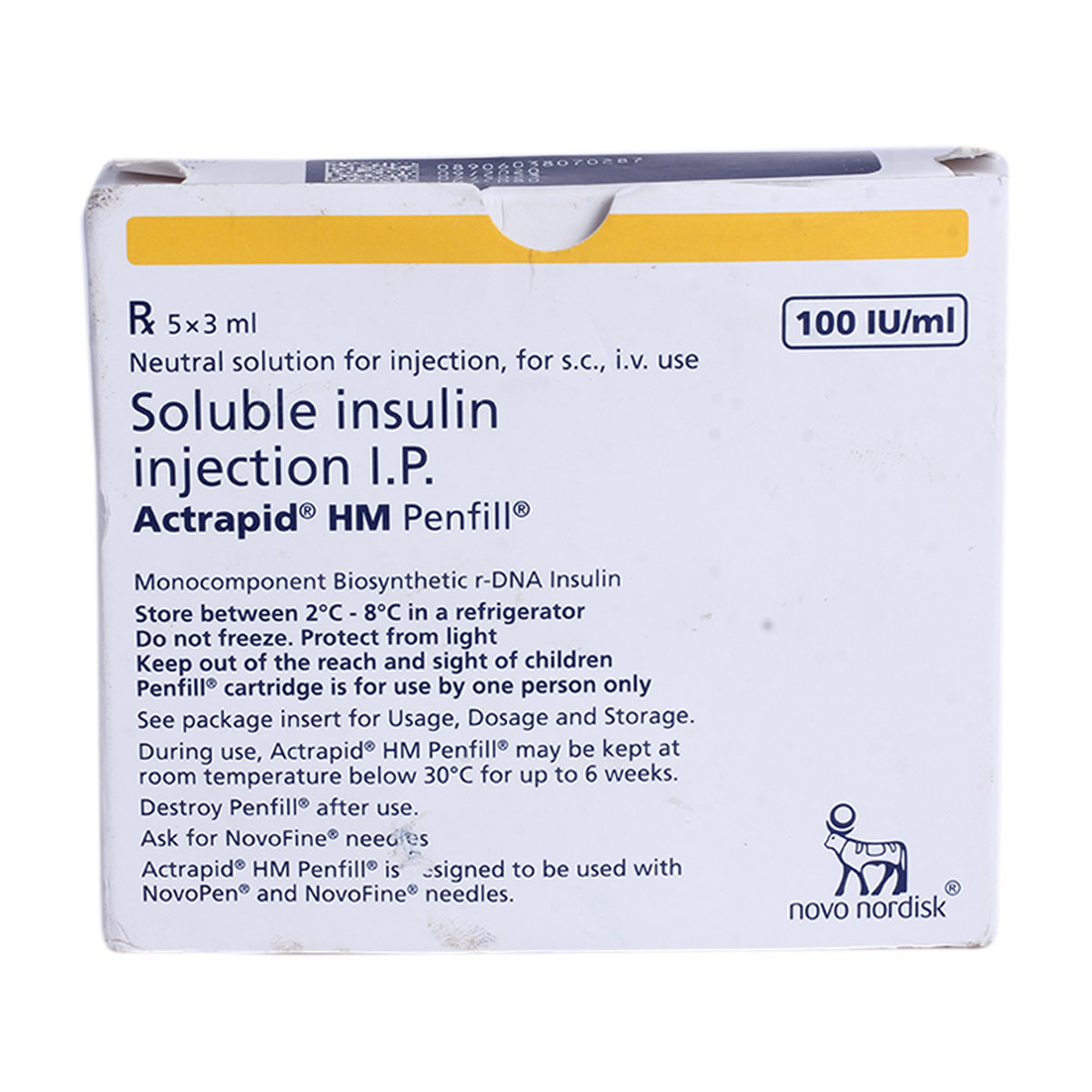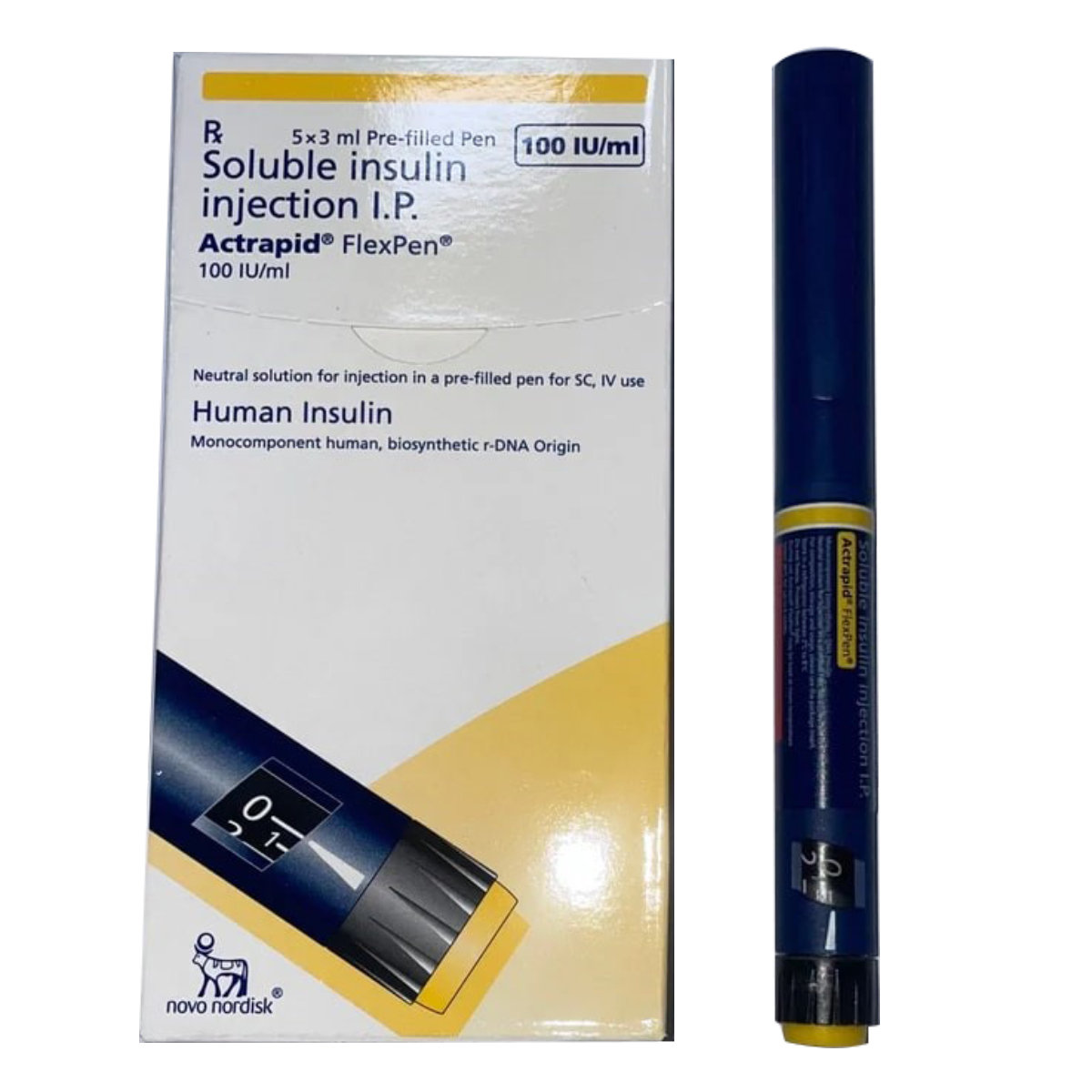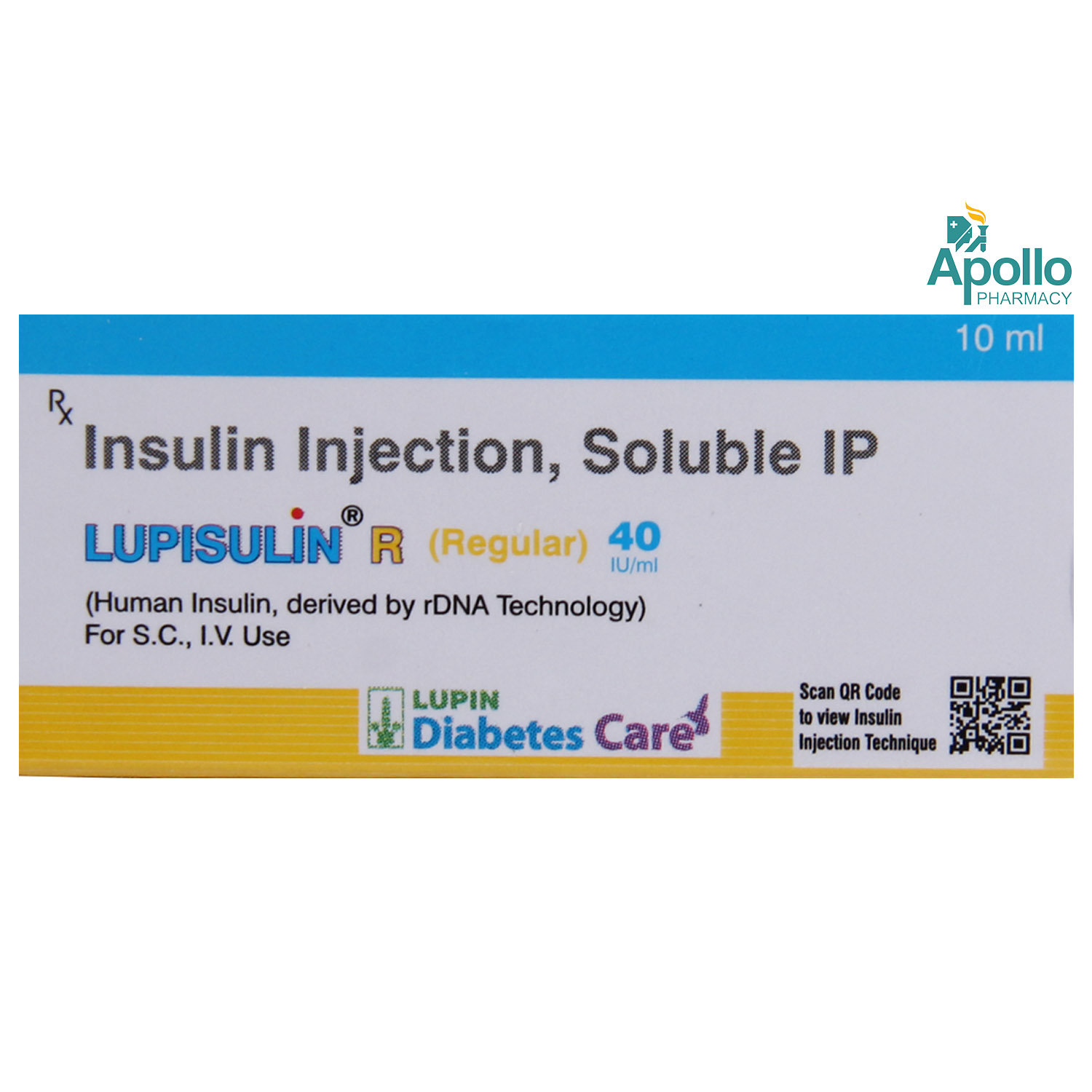Regular Human Insulin
About Regular Human Insulin
Regular Human Insulin belongs to the group of medications called ‘antidiabetics’ used in the treatment of type 1 and type 2 diabetes mellitus. Diabetes mellitus (DM) is a condition in which glucose levels are elevated in the body. In type 1 diabetes, the body does not make enough insulin (a hormone essential for the metabolism of glucose). On the other hand, in type 2 diabetes, the body cells do not respond to insulin, or in later stages, your body may not produce enough insulin. Symptoms of DM include excessive thirst, excessive hunger, fatigue, increased appetite, and dry mouth. This condition may worsen over time and cause toxic effects if not properly treated.
Regular Human Insulin contains ‘regular human insulin’ which is a short-acting insulin. It starts to work within 30 min after injection and its action lasts up to 8 hours. It replaces the deficient hormone 'insulin' in patients with diabetes. It increases the uptake of glucose by cells, thereby improving glucose metabolism. This effect helps in decreasing glucose levels in the blood.
Regular Human Insulin is available in the form of injection. It is taken subcutaneously (under the skin). You should take this medicine as prescribed by your doctor. A healthcare professional will teach you how to take the injection. It can cause some side-effects such as low blood sugar, swelling in your hands or feet, weight gain, or thickening of the skin where you injected the medicine. Consult your doctor if any of these effects persist or get worsen.
Do not take Regular Human Insulin if you are allergic to ‘insulin’ or if you have an episode of hypoglycemia (low blood sugar). Talk to your doctor if you have a history of liver disease, kidney disease and if you are pregnant or breastfeeding. Also, inform your doctor if you are taking any other antidiabetic medications. If you experience an episode of hypoglycemia, seek medical attention immediately.
Uses of Regular Human Insulin
Medicinal Benefits
Regular Human Insulin is a short-acting form of insulin that helps lower blood sugar levels in both adults and children. It stimulates the recovery of sugar in muscle and fat cells and thus suppresses the production of sugar in the liver. Regular Human Insulin helps in improving glycemic control which in turn decreases the risk of progression of complications of diabetes like damage to the retina (retinopathy), damage of kidney (nephropathy), damage of nerve cells (neuropathy), delayed wound healing, diabetic foot ulcer, and others.
Directions for Use
Storage
Side Effects of Regular Human Insulin
- Low blood sugar
- Swelling in your hands or feet
- Weight gain
- Thickening of the skin at the site of injection
Drug Warnings
Regular Human Insulin is for subcutaneous (under the skin) use only. However, in rare cases, it can be given via infusion intravenously under medical supervision. If you are changing the insulin brand or injecting your insulin by another method, it should be done under strict medical supervision. Cases of heart failure have been reported when pioglitazone was used with insulin, especially in patients at high risk of cardiac heart failure. The first hyperglycemia symptoms (high blood sugar level) may include excessive thirst, dry mouth, increased frequency of urination, nausea, vomiting, drowsiness, flushed dry skin, loss of appetite, and acetone odour of the breath. You should closely monitor these symptoms. Symptoms like heart failure, weight gain, and oedema (fluid deposition in tissue) should not be overruled. It is advisable not to consume alcohol as it may either increase or decrease your blood glucose level. Care should be taken while travelling across more than two time zones. Your doctor may adjust your insulin schedule. Regular Human Insulin may decrease the level of potassium, leading to a state of hypokalaemia that, if left untreated, may lead to respiratory paralysis, irregular heartbeat rhythm, coma, and even death. Do not take Regular Human Insulin if you have any low blood glucose levels, kidney, liver, or heart problems, or problems with alcohol or other prescription recreational drugs.
Drug Interactions
Drug-Drug Interactions: Regular Human Insulin may interact with antidiabetic medications such as thiazolidinediones (rosiglitazone and pioglitazone) and increase the risk of heart failure. It may also interact with antibiotics (levofloxacin, norfloxacin, and ofloxacin, etc), antidepressants, medications to treat high blood pressure (enalapril, lisinopril, captopril, losartan, valsartan, propranolol, and metoprolol), diuretics, medications used to treat heart diseases and cause hypoglycemia (low blood sugar).
Drug-Food Interactions: Try to avoid alcoholic beverages with Regular Human Insulin as it may alter your blood glucose levels.
Drug-Disease Interactions: Regular Human Insulin should not be given to patients with kidney disease, liver disease, low blood sugar level (hypoglycemia), and low potassium level (hypokalaemia).
Drug-Drug Interactions Checker List:
Safety Advice

Alcohol
cautionConsumption of alcohol may alter glucose levels and increase the risk of side-effects.

Pregnancy
cautionRegular Human Insulin should be used in pregnant women only if clinically needed.

Breast Feeding
cautionRegular Human Insulin should be used in breastfeeding mothers only if clinically needed.

Driving
cautionRegular Human Insulin may decrease glucose levels. So, avoid driving or operating heavy machinery while using this medicine.

Liver
cautionRegular Human Insulin should be used with caution in patients with liver diseases. Your doctor may adjust the dose of this medicine before prescribing.

Kidney
cautionRegular Human Insulin should be used with caution in patients with kidney diseases. Your doctor may adjust the dose of this medicine before prescribing.

Children
cautionRegular Human Insulin is not recommended for use in children below 2 years of age. However, it can be used for the treatment of diabetes in children above 2 years of age.
Habit Forming
Diet & Lifestyle Advise
- Do exercise as it may lower your body’s need for insulin during and for some time after the physical activity. It may also speed up the effect of an insulin dose, especially if the exercise involves the area of the injection site (for example, the leg should not be used for injection just prior to running).
- Discuss with your doctor how you should adjust your insulin regimen to accommodate exercise.
- Avoid eating sugar food and prefer cooked food that is low in calories.
- Talk to your doctor concerning adjustments in your insulin schedule when traveling across more than 2 time zones.
Special Advise
Your doctor may advise you to have regular monitoring of the following tests: eye, foot, and dental exam at least once a year, cholesterol test, blood pressure, and heart rate.
Patients Concern
Disease/Condition Glossary
Type 1 diabetes mellitus: In type 1 diabetes mellitus, our body does not make insulin (the hormone which helps to decrease sugar levels in the blood) to control blood sugar levels.
Type 2 diabetes mellitus: In type 2 diabetes mellitus, either the body stops producing enough insulin, or there is resistance to the action of insulin. As a result, insulin is produced in sufficient amounts but is unable to act on the tissues of the organs.
FAQs
Regular Human Insulin works by increasing the glucose uptake by fats and muscles, suppresses the production of glucose in the liver, and also the formation of glycogen from glucose. These effects help in reducing the glucose levels in the blood.
In hypoglycemia, blood sugar levels decrease significantly. It causes symptoms such as dizziness, headache, sweating, hunger, loss of consciousness, rapid breathing, or seizure (fits). In such cases, seek medical attention immediately.
If you experience low blood sugar, eat glucose tablets, chocolate, or another high sugar snack such as sweet or biscuit. Use a blood glucose monitor to test your blood sugar levels after 15 minutes if possible. Eat a snack or have proper meals if the blood glucose returns to normal.
You should not change the brand of medicine or syringe without informing your doctor. It decreases blood sugar levels, so avoid driving or operating heavy machinery if you have any signs of low sugar levels. Do not take alcohol as it may worsen the health condition.
Regular Human Insulin can be used to treat both type 1 diabetes and type 2 diabetes. However, your doctor will decide what medications to be given based on your health condition.








